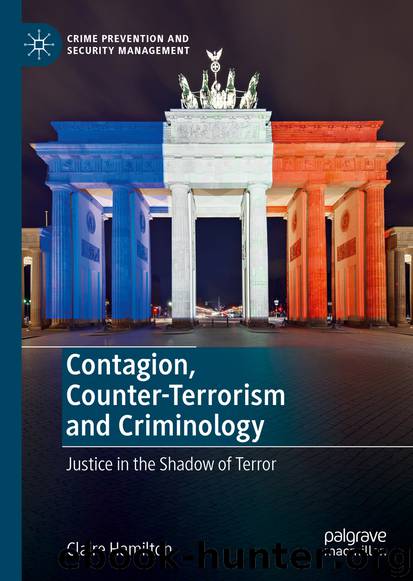Contagion, Counter-Terrorism and Criminology by Claire Hamilton

Author:Claire Hamilton
Language: eng
Format: epub
ISBN: 9783030123222
Publisher: Springer International Publishing
Counter-Terrorism After 9/11
Domestic Legislation
Given the significant counter-terrorist arsenal already in place in France, the events of 9/11 marked less of a watershed, both conceptually and organisationally, than in other jurisdictions (Bigo and Camus, 2006). This view was echoed strongly by our interviewees who rather considered the Paris and St Denis attacks in 2015 ‘the French 9/11’.3 Having said that, as will become apparent below, the Twin Tower attacks were met with a not insignificant legislative response in France, including the creation of new terrorist offences, the extension of coercive and covert investigation tools and the reduction of the oversight powers of the judiciary (Cahn, 2010; Hellmuth, 2015). Important here also in light of our focus on contagion is the fact that much of this legislation extended to other areas of the criminal justice system unrelated to terrorism, creating conceptual confusion between crimes such as organised crime and terrorism, and suggesting that counter-terrorism was used as a pretext to reach parliamentary consensus over broad security laws (Hellmuth, 2015; Hodgson, 2013; Human Rights Watch, 2008; Oehmichen, 2009).
While continuity and a deepening of the existing strategy of prevention can be said to best characterise the French response in the post-9/11 period, one very significant development in more recent years is the increasing resort to administrative measures in the fight against terrorism (Weil, 2018). This is best illustrated by legislation passed in 20144 that introduced administrative police measures aimed at preventing travel by suspected foreign terrorist fighters (FTFs ) to places such as Syria and Iraq, together with the major expansion of administrative investigations envisaged in the July 2015 surveillance legislation.5 This trend was consolidated and extended with the legislation which followed the declaration of the state of emergency in November 20156 and the introduction of administrative measures such as house searches, house arrests and bans on demonstrations. As will be discussed, following legislation enacted in October 2017,7 some of these measures have now been incorporated into the permanent criminal law. What follows below is a brief synopsis of the main domestic counter-terrorism acts introduced between 2001 and 2017. Given the need to simplify what has become an increasingly complex legislative patchwork, only the most significant counter-terrorism statutes are discussed, and within these legislative texts, only the main provisions. This is followed by a brief discussion of reforms introduced on foot of European Union legislation, although as we shall see, the impact of this legislation has been much less in France than in jurisdictions with a less developed counter-terrorism apparatus.
Download
This site does not store any files on its server. We only index and link to content provided by other sites. Please contact the content providers to delete copyright contents if any and email us, we'll remove relevant links or contents immediately.
The Pirates of Somalia by Jay Bahadur(1621)
Political Theology by Carl Schmitt(1577)
The Holocaust: A New History by Laurence Rees(1520)
The Social Animal by David Brooks(1451)
A Practical Guide to International Arbitration in London by Hilary Heilbron(1434)
Restitution by Restitution(1424)
Pirates of Somalia by Jay Bahadur(1376)
Coercing Virtue by Robert H. Bork(1356)
The Nuremberg Interviews by Leon Goldensohn(1304)
Basic International Corporate Taxation by Sebastiano Garufi(1214)
A History Of Thailand by Baker Chris(1187)
International Trade and Business: Law, Policy and Ethics by Gabriël Moens & Peter Gillies(1137)
The Global Commons by Susan J. Buck(1137)
The Sovereignty of Human Rights by Macklem Patrick(1113)
Blood Profits by Vanessa Neumann(1113)
Asian Waters by Humphrey Hawksley(1113)
Spring Fever: The Illusion of Islamic Democracy by McCarthy Andrew C(1097)
The Nuremberg Trials: The Nazis and their Crimes Against Humanity by Roland Paul(1043)
Crimes Against Humanity: Historical Evolution and Contemporary Application by M. Cherif Bassiouni(1022)
